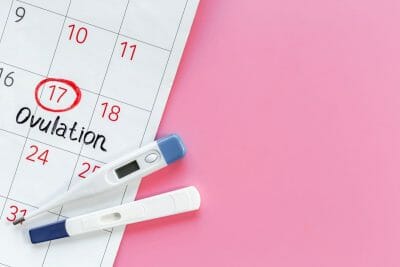Polycystic Ovary Syndrome (PCOS) is a common hormonal disorder that affects many women of reproductive age. One of the most common symptoms of PCOS is irregular menstrual cycles, which can be caused by a variety of factors.
Women with PCOS may experience missed or irregular periods, prolonged and heavy periods, as well as painful menstruation (dysmenorrhea). These changes in menstrual cycles can be distressing for women, and can also make it difficult to become pregnant.

Understanding PCOS
What is PCOS?
Polycystic ovary syndrome (PCOS) is a hormonal disorder that affects women of reproductive age. It is a common condition that affects up to 10% of women worldwide. Women with PCOS have an imbalance of hormones, which can lead to a variety of symptoms.
The exact cause of PCOS is not known, but it is thought to be related to insulin resistance, which can cause the ovaries to produce too much testosterone. This can lead to the formation of small cysts on the ovaries, which can interfere with ovulation.
Common Symptoms of PCOS
The most common symptoms of PCOS include irregular periods, heavy bleeding, and difficulty getting pregnant. Women with PCOS may also have acne, excess hair growth, and weight gain.
Irregular periods are a hallmark of PCOS. Women with PCOS may have periods that are infrequent or absent, or they may have periods that last for several days. Heavy bleeding is also common, and may be caused by the buildup of the uterine lining due to irregular ovulation.
Excess hair growth, or hirsutism, is another common symptom of PCOS. This can occur on the face, chest, back, or other areas of the body. Weight gain is also common, and may be caused by insulin resistance.
PCOS and Hormonal Imbalance
Polycystic Ovary Syndrome (PCOS) is a hormonal disorder that affects women of reproductive age. It is characterized by the presence of multiple cysts in the ovaries and an imbalance of hormones, including androgens and insulin. These hormonal imbalances can have a significant impact on a woman’s menstrual cycle and ovulation.
Role of Androgens
Androgens are male hormones that are present in both men and women. However, women typically have lower levels of androgens than men. In women with PCOS, the ovaries produce excess androgens, which can interfere with the normal functioning of the reproductive system.
One of the primary ways in which excess androgens can affect menstruation and ovulation is by causing irregular periods. Women with PCOS may experience longer or shorter menstrual cycles, or they may skip periods altogether. This is because the excess androgens can interfere with the development and release of eggs from the ovaries.
In addition, excess androgens can lead to the development of cysts on the ovaries. These cysts can further disrupt the normal hormonal balance and interfere with ovulation.
Insulin Resistance and PCOS
Insulin is a hormone that helps regulate blood sugar levels in the body. In women with PCOS, the body may become resistant to insulin, meaning that it is less effective at regulating blood sugar levels. This can lead to higher levels of insulin in the body, which can contribute to the production of excess androgens.
Insulin resistance can also affect the menstrual cycle and ovulation. Women with PCOS who are insulin resistant may experience more severe symptoms, including irregular periods and difficulty becoming pregnant.
PCOS and Menstruation
Polycystic Ovary Syndrome (PCOS) is a hormonal disorder that affects many women of reproductive age. One of the most common symptoms of PCOS is menstrual irregularity. In this section, we will discuss how PCOS can affect menstruation and the different types of menstrual irregularities that women with PCOS may experience.
Irregular Periods
Women with PCOS may experience irregular periods, which means that the length of their menstrual cycle can vary from month to month. Some months, they may have a shorter cycle, while other months they may have a longer cycle. This can make it difficult to predict when their next period will come, which can be frustrating and stressful.
Periods that Stop then Resume
Another common menstrual irregularity that women with PCOS may experience is periods that stop and then resume, i.e, bleeding is halted then resumes. This means that they may have a period for a few days, and then it stops for a few days before starting again. This can be confusing and make it difficult to track their menstrual cycle.
Missed Periods
Women with PCOS may also experience missed periods, which means that they do not have a menstrual period for several months at a time. This can be a sign that they are not ovulating regularly, which can make it difficult to become pregnant. It is important for women with PCOS who are trying to conceive to speak with their healthcare provider about their options for fertility treatment.
PCOS and Ovulation
Polycystic Ovary Syndrome (PCOS) can affect ovulation, the process by which a mature egg is released from the ovary. Ovulation is a crucial part of the menstrual cycle and is necessary for conception to occur. Without ovulation, it can be difficult for women to get pregnant.
Ovulation Disruptions
PCOS can disrupt ovulation in several ways. One of the most common is anovulation, which means that ovulation doesn’t occur at all. Women with PCOS may have irregular menstrual cycles or miss periods altogether, which can make it difficult to predict when ovulation will occur.
In some cases, PCOS can cause immature eggs to be released, which can also prevent pregnancy. Additionally, PCOS can cause small follicle cysts to develop on the ovaries, which can interfere with the release of mature eggs.
Fertility Challenges
Because PCOS can disrupt ovulation, it can make it difficult for women to get pregnant. Women with PCOS may experience trouble getting pregnant or require fertility treatments to conceive. However, it’s important to note that not all women with PCOS experience fertility challenges.
Treatment for PCOS-related infertility may include medications to stimulate ovulation, such as clomiphene citrate or letrozole. In some cases, assisted reproductive technologies such as in vitro fertilization (IVF) may be necessary.
Diagnosis of PCOS
Polycystic ovary syndrome (PCOS) can be challenging to diagnose, as its symptoms vary widely and can be similar to other conditions. Additionally, there is no single test to diagnose PCOS. Instead, doctors typically rely on a combination of medical history, physical exams, and laboratory tests.
Blood Tests
One of the most common diagnostic tools for PCOS is blood tests. These tests can measure hormone levels, including testosterone, luteinizing hormone (LH), follicle-stimulating hormone (FSH), and sex hormone-binding globulin (SHBG). Additionally, doctors may test for insulin resistance and glucose levels to rule out diabetes.
Ultrasound Examination
Another common diagnostic tool for PCOS is ultrasound examination. This imaging test uses sound waves to create images of the ovaries and uterus. During the exam, doctors can check for the presence of ovarian cysts and measure the thickness of the uterine lining.
While ultrasound examination can be helpful in diagnosing PCOS, it is not always necessary. In some cases, doctors may diagnose PCOS based on a patient’s symptoms and medical history alone.
Complications of PCOS
Women with PCOS are at a higher risk of developing certain health problems. The following sub-sections will explore two of the most common complications of PCOS.
Metabolic Syndrome
Metabolic syndrome is a group of conditions that occur together and increase the risk of heart disease, stroke, and type 2 diabetes. Women with PCOS are at a higher risk of developing metabolic syndrome. This is because PCOS is associated with insulin resistance, which means that the body is unable to use insulin effectively. Insulin resistance can lead to high blood sugar levels, which can cause metabolic syndrome.
Women with PCOS who have metabolic syndrome may have the following symptoms:
- High blood pressure
- High blood sugar levels
- High levels of triglycerides (a type of fat) in the blood
- Low levels of HDL cholesterol (the “good” cholesterol) in the blood
- Excess body fat around the waist
Endometrial Cancer
Endometrial cancer is a type of cancer that starts in the lining of the uterus. Women with PCOS are at a higher risk of developing endometrial cancer because they often have irregular periods, which can cause the lining of the uterus to build up. This can lead to a condition called endometrial hyperplasia, which can increase the risk of endometrial cancer.
Women with PCOS who have endometrial hyperplasia may have the following symptoms:
- Abnormal vaginal bleeding
- Heavy periods
- Bleeding between periods
- Pelvic pain
It is important for women with PCOS to have regular gynecological check-ups to detect any signs of endometrial hyperplasia or endometrial cancer. If detected early, endometrial cancer is highly treatable.
Treatment and Management of PCOS
PCOS is a chronic condition that requires lifelong management. There is no cure for PCOS, but its symptoms can be managed with a combination of medications, supplements, and lifestyle changes.
Medications and Supplements
Several medications and supplements are used to treat PCOS symptoms. Birth control pills are often prescribed to regulate menstrual cycles and reduce androgen levels. Metformin, a medication used to treat type 2 diabetes, can also help regulate menstrual cycles and improve insulin resistance. Letrozole, Clomid, and Femara are medications that can be used to induce ovulation in women with PCOS who are trying to conceive. In some cases, laparoscopic ovarian drilling may be recommended to induce ovulation.
Supplements such as inositol, omega-3 fatty acids, and vitamin D may also be used to manage PCOS symptoms. Inositol, a type of sugar, has been shown to improve insulin resistance and menstrual regularity. Omega-3 fatty acids may reduce inflammation and improve lipid profiles in women with PCOS. Vitamin D supplementation may improve insulin resistance and androgen levels in women with PCOS who are deficient in this vitamin.
Lifestyle Changes
Lifestyle changes can also be effective in managing PCOS symptoms. Weight loss and maintaining a healthy weight can improve insulin resistance and reduce androgen levels, leading to improved menstrual regularity and ovulation. A healthy diet that is low in processed foods and high in fruits, vegetables, and lean protein can also improve insulin resistance and reduce inflammation.
Regular exercise can also improve insulin resistance and reduce androgen levels. Exercise can also help with weight loss and improve overall health. Women with PCOS should aim for at least 150 minutes of moderate-intensity aerobic exercise per week, such as brisk walking, cycling, or swimming.
Final Words on PCOS, Menstruation, and Ovulation
PCOS can have a significant impact on a woman’s menstrual cycle and ovulation. Women with PCOS may experience irregular periods, missed periods, heavy bleeding, or prolonged periods. They may also have difficulty ovulating, which can make it harder to conceive.
While PCOS cannot be cured, there are treatments available to help manage symptoms and improve fertility. Lifestyle changes such as maintaining a healthy weight, exercising regularly, and eating a balanced diet can also be helpful.
It’s important for women with PCOS to work closely with their healthcare provider to develop a treatment plan that is tailored to their individual needs. This may include medications to regulate menstrual cycles and promote ovulation, as well as fertility treatments such as in vitro fertilization (IVF) or intrauterine insemination (IUI).
Overall, with proper management and care, women with PCOS can still have healthy pregnancies and live fulfilling lives. It’s important to stay informed about the condition and seek support from healthcare professionals, loved ones, and support groups.
